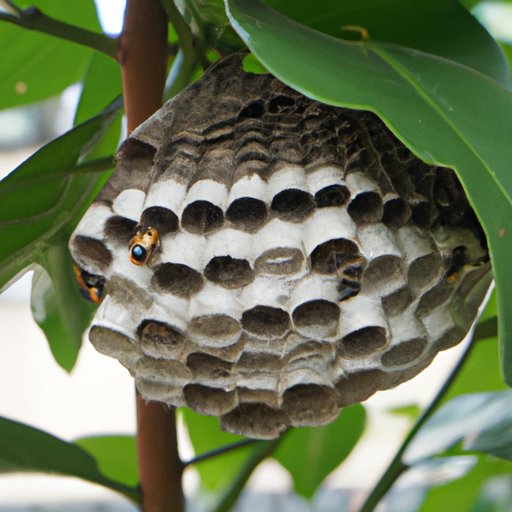I. Introduction
Wasps are a common problem for homeowners, especially during the summer months. These stinging insects can be a real nuisance for those who enjoy spending time outside, and can even pose a serious health risk for those who are allergic to their stings. The purpose of this article is to provide effective strategies for keeping wasps away from your home and yard.
II. Seal Gaps and Openings
One of the main ways that wasps enter homes and build nests is through gaps and openings in the exterior. Cracks, crevices, and holes provide ideal nesting sites for wasps, so it’s important to seal these areas to prevent wasp infestations from occurring. Use caulk to fill in any gaps around windows, doors, and vents, and install screens over vents and other openings.
III. Avoid Sweet Smells
Wasps are also attracted to sweet smells, like those found in perfumes, colognes, and sweet food or drinks. To deter wasps from coming near you, avoid using scented products when spending time outside. Similarly, keep sugary drinks and foods covered and away from your outdoor activities.
IV. Keep Food Covered
When eating outside, it’s important to keep your food and drink covered. This helps prevent wasps from being attracted to the food and also keeps flies and other insects away. Use covers or mesh screens to keep food and drink containers closed when not in use.
V. Use Natural Repellents
Natural repellents can be an effective way to keep wasps away from your home and yard. Peppermint oil, citronella, and eucalyptus are all known to be effective at repelling wasps. To use these repellents, mix a few drops of the oil with water in a spray bottle and apply it to areas where wasps are likely to be found. You can also use these oils in diffusers to keep wasps away.
VI. Use Fake Nests
Wasps are territorial creatures and will avoid areas where other wasp colonies exist. One way to take advantage of this behavior is by hanging up fake wasp nests around your yard. These fake nests are designed to look like real wasp nests and can be purchased online or at home improvement stores.
VII. Plant Insect-Repelling Plants
Using plants to repel wasps is another effective strategy. Certain plants, like mint, lemongrass, and marigolds, are known to be particularly effective at repelling wasps. These plants can be incorporated into your yard in the form of potted plants or by planting them directly in the ground.
VIII. Call A Professional
If all else fails, it may be necessary to call a professional pest control service to safely remove any wasp nests that have already been established on your property. Attempting to remove a wasp nest on your own can be dangerous and should only be done with the proper equipment and protective clothing.
IX. Conclusion
By following these strategies, you should be able to keep wasps away from your home and yard. Remember to seal gaps and openings, avoid sweet smells, keep food covered, use natural repellents, hang up fake nests, use insect-repelling plants, and call a professional if necessary. With a little effort, you can enjoy your time outside without the worry of being bothered by wasps.
